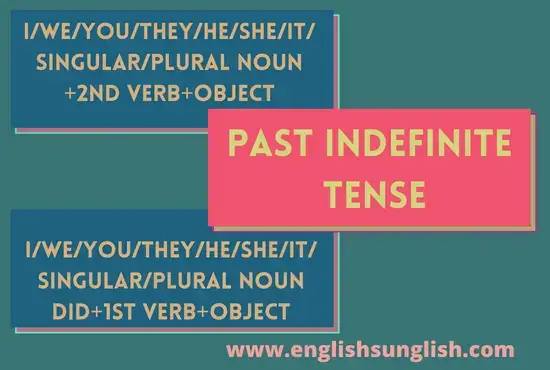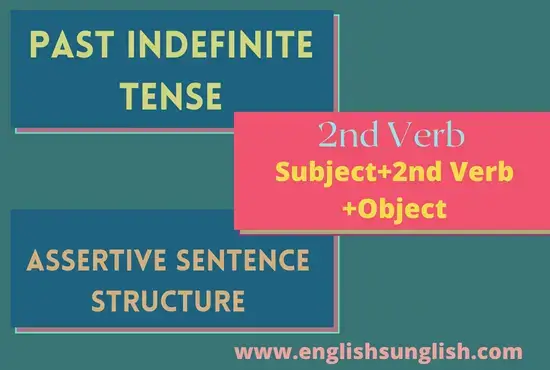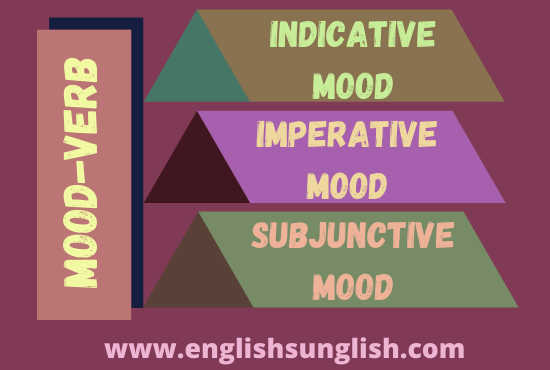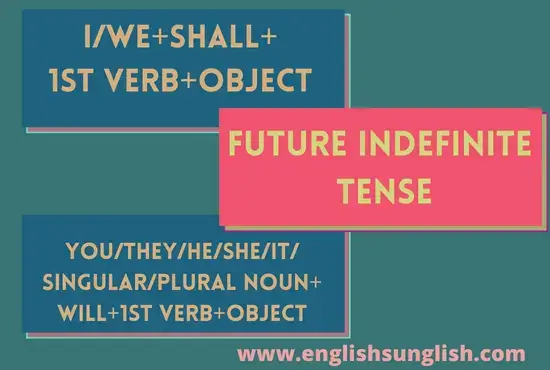Past Indefinite Tense| Definition, rules, Formula, Examples

Simple Past Tense or Past Indefinite Tense is used when the purpose is to point out some action that happened in the past period. It means that Past Indefinite Tense simply states actions of the past period that had been practiced in the past period without mentioning the status of its completeness or incompleteness. For example:
- I spoke.
- You spoke.
- He spoke.
- We spoke.
- They spoke.
Helping Verbs of Simple Past Tense or Past Indefinite Tense
The Assertive Sentences of Past Indefinite Tense do not take any helping verb to express the actions of the past period. Instead, Assertive Sentences of Past Indefinite Tense use the “2nd form of Verb” without any helping verb with all pronouns and number nouns. And thus, Assertive Sentences of Past Indefinite Tense has the following Sentence Structure:
Subject+ 2nd form of Verb+ Object+ Remaining Words
“Did” is used as a helping verb in Negative, Interrogative, and Negative Interrogative Sentences, with 1st form of helping Verb.

Sentence Structure of Simple Past Tense or Past Indefinite Tense
Negative, Interrogative, and Negative-Interrogative Sentences of Past Indefinite Tense use “did” as a helping verb with the 1st form of the Verb. However, Assertive Sentences of Past Indefinite Tense do not use any helping verb, instead, they use only the 2nd form of the Verb with their subject.
Assertive Sentence Structure of Simple Past Tense or Past Indefinite Tense
Assertive Sentences of Past Indefinite Tense use the 2nd form of Verb with all types of pronouns and nouns to express the actions of a little while ago. So, Assertive Sentences of Past Indefinite Tense has the following arrangement of subject, verb, and object.
Subject+ 2nd form of Verb+ Object+ Remaining Words

Examples of Assertive Sentences of Simple Past Indefinite Tense
Following are some examples of Assertive Sentences of Past Indefinite Tense.
Subject+ 2nd form of Verb+ Object+ Remaining Words
I
- I posted the letter.
- I received your letter.
- I liked him for his honesty.
- I solved that puzzle.
- I went for a morning walk early in the morning.
- I wrote the essay to highlight the social issues of our society.
- I liked to sing at parties.
- I took bath daily before going to my school.
- I saw him near that market.
- I met with an accident while visiting my Uncle’s house.
- I performed a joker role on the stage.
- I wished that I become a great bureaucrat.
We
- We boarded the train.
- We waited for you.
- Our team won the match.
- We did our work ourselves.
- We read that funny article.
- We wore simple dresses.
- We worked hard to meet our deadlines.
- We loved to help needy people.
- We came for the launch in this restaurant.
- We planned to organize a concert to help disabled people.
- We met him in his office to discuss the social evil of child labor.
- We were welcomed warmly by them. (Passive Voice)
You
- You invited me to tea.
- You looked after my brother.
- You ate the apple.
- You refused to help me in my most difficult times.
- You pretended as if you know nothing about that theft.
- You performed very well on stage, despite a great audience.
- You showed affection for the young.
- Your behavior with your parents was sick. (Passive Voice)
- You borrowed some money from me last year, and you had not returned it yet.
- You liked to tease others.
They
- They gave us a gift.
- They acted upon our advice.
- The travelers set the forest on fire.
- People caught the thief.
- The boys made a noise.
- The students told the lesson.
- The people held a meeting in the garden.
- The laborers took out a procession.
- The students raised slogans.
- The clerks went on strike.
- The laborers called off the strike.
- The children learned their lesson by heart.
He
- David won the prize.
- Harry made a beautiful picture.
- He ran for his life.
- He refused to give his book.
- The teacher punished the students.
- The headmaster finds the naughty boy.
- The doctor operated on the patient.
- Ali bought books.
- He went to school daily.
- He offered prayers five times a day.
- John cleaned his room.
- He succeeded in developing a CPF number generating tool.
She
- The grandmother told us a strange story.
- The teacher taught the lesson well.
- Naseema wept.
- The virtuous woman brought the orphan up.
- She plucked those pink flowers.
- She preferred coffee to tea.
- She liked to buy colorful books.
- Marry worked in a garment factory to earn her livelihood.
- She did her work on time.
- She read various kinds of magazines.
- She washed her clothes clean.
- She disliked taking breakfast early in the morning.
It
- It was thundering outside. (Passive Voice)
- Fire blew.
- The rainy season bought its blessings to farmers last year.
- It was 11’O clock by watching. (Passive Voice)
- The heavy flood destroyed the road that leads to the main city.
- The dog chased the rabbit.
Negative Sentence Structure of Simple Past Indefinite Tense
Negative Sentences of Past Indefinite Tense use “did” as a helping verb with “not”, to express the negativity of the sentence. Negative Sentences of Past Indefinite Tense has the following sentence structure.
Subject+ Did+ not+ 1st form of Verb+ Object+ Extension of the Predicate

Examples of Negative Sentences of Simple Past Indefinite Tense
Following are some examples of Negative Sentences of Past Indefinite Tense.
Subject+ Did+ not+ 1st form of Verb+ Object+ Remaining Words
I+ Did+ not
- I did not make fun of him.
- I did not send a letter to my father by airmail.
- I did not write a letter to my mother.
- I did not wish to meet her.
- My brother did not say goodbye at the railway station.
- I did not abuse them.
- I did not buy anything from that shop.
- I did not miss my school bus yesterday.
- I did not take much interest in his offer.
- I did not like to play with my opponents on my team.
We+ Did+ not
- We did not care for him.
- We did not visit all the historical places.
- We did not like cricket much.
- We did not take our lunch.
- We did not read any newspapers to keep ourselves up to date.
- We did not scold them.
- We did not reply to the email on time.
- We did not say anything wrong to them.
- We did not wash your clothes yesterday.
- We did not invite them to tonight’s party.
You+ Did+ not
- You did not fulfill your promise.
- You did not listen to me.
- You did not inform me of the decision.
- You did not repair the television.
- You did not enjoy the party.
- You did not draw the map of North America.
- You did not make much progress.
- You did not make a beautiful garland.
- You did not take your medicine on time.
They+ Did+ not
- They did not help us.
- People did not protest against this law.
- The police did not arrest the thief.
- The police did not disperse the crowd.
- They did not push me aside.
- The army did not capture the fort.
- They did not accept our invitation.
- They did not stand by their friends.
- They did not know him.
- The people did not ready to help the needy.
He+ Did+ not
- He did not obey his parents.
- He did not escape punishment.
- The principal did not distribute the prizes.
- The wrestler did not knock out his opponent.
- He did not tell a lie.
- He did not sell his whole property.
- He did not hate anyone.
- He did not go to the office.
- He did not mind your bitter words.
- He did not bring up his younger brother.
She+ Did+ not
- She did not tell a lie.
- She did not sew her clothes.
- She did not respect her elders.
- She did not encourage her juniors.
- She did not prepare dinner.
- She did not play with her siblings.
- She did not support democracy.
- She did not take bath daily.
- She did not prefer coffee to tea.
- She did not accept her guilt.
It+ Did+ not
- The airplane did not take off at quarter to eight.
- It did not take much time to complete.
- It did not rain outside.
- This road did not lead to the main city.
- It did not cloudy yesterday.
- This story did not emphasize humanity.
Interrogative Sentence Structure of Simple Past Indefinite Tense
“Did” is used at the start of the Interrogative Sentences to show the interrogative nature of the sentences. However, Interrogative Sentences with words of Questions have “did” after them. So, Interrogative Sentences with words of Question have the following Sentence Structure:
Word of Question+ did+ Subject+ 1st form of Verb+ Object+ Extension of the Predicate+?
Interrogative Sentences without Word of Question have the following Sentence Structure:
Did+ Subject+ 1st form of Verb+ Object+ Extension of Predicate+ ?

Examples of Interrogative Sentences of Simple Past Indefinite Tense
Following are some examples of Interrogative Sentences of Past Indefinite Tense:
Word of Question+ Did+?
Interrogative Sentences of Past Indefinite Tense have the following Sentence Structure:
Word of Question+ did+ Subject+ 1st form of Verb+ Object+ Remaining Words+ ?
- Whom did you consult?
- Why did he insult you?
- When did the lion carry away the cow?
- Where did you find this book?
- Why did he tear the paper?
- Who swept the room?
- How did they greet you?
- How did the cook prepare rice?
- Why did Harry burn the candle at both ends?
- When did the airplane land at the airport?
- Where did the goods train collide with the passenger train?
- Where did you see the mad dog?
- How did the laborer carry so much load?
- To whom did the doctor give the injection?
- When did they reach Karachi?
Interrogative Sentences Without Word of Question:
Interrogative Sentences of Past Indefinite Tense without Word of Question have the following arrangement of subject, verb, and object
Did+ Subject+ 1st form of Verb+ Object+ Remaining Words+ ?
Did+ I+ ?
- Did I say something very emotional?
- Did I message him?
- Did I refuse to help her?
- Did I prefer coffee to tea?
- Did I blame you for all my loss?
- Did I borrow some money from them?
- Did I water plants daily?
- Did I pluck a rose from your garden?
- Did I live in my selfish wishes?
- Did I always stand first in my class?
Did+ We+ ?
- Did we serve them improperly?
- Did we propose a foolish idea before the committee?
- Did we listen to music last night?
- Did we refuse to help you?
- Did we understand his condition fully?
- Did we always humiliate them with our bad behavior?
- Did we think more about ourselves than our parents?
- Did we gift them this bungalow?
- Did we attend your grandmother’s funeral?
- Did we scold those children?
Did+ You+?
- Did your friends congratulate you on your success?
- Did your friends like this party?
- Did you enjoy the flight?
- Did your brother lend you a hand?
- Did you reach home safe and sound?
- Did you see this movie ago?
- Did you listen to music the whole night?
- Did you like nature photography?
- Did you enter this room with your pen?
- Did you always stand by your younger siblings?
Did+ They+ ?
- Did they buy a new house?
- Did they order the peon to ring the bell?
- Did they overcharge their customers?
- Did they ready to appear before a judge to confess their guilt?
- Did the players play the hockey match in this playground?
- Did the laborers dig the soil yesterday?
- Did they drink the whole mango juice?
- Did they smell flowers?
- Did they serious about this project?
- Did they make a plan on how to make this proposal successful?
Did+ He+ ?
- Did the officer transfer his peon?
- Did the Magistrate catch him red-handed?
- Did Ali lose weight due to overworking?
- Did he take proper sleep and diet to keep himself healthy?
- Did that tailor sew my clothes?
- Did he tell a lie?
- Did he play cricket well?
- Did he criticize his opinion?
- Did he go to the gym to keep himself healthy?
- Did he always blame you for his failures?
Did+ She+ ?
- Did she support urbanization?
- Did she wash his clothes with her hands?
- Did she always wear a spick and span dress?
- Did she always abide by her parents?
- Did she always speak the truth?
- Did she dislike him due to his poverty?
- Did she tend before God in her most difficult times?
- Did she go to London last year?
- Did she buy a new toy for her baby?
- Did she prefer ice cream to a brownie?
Did+ It+ ?
- Did it dirty the room?
- Did it 4’O clock by your watch then?
- Did his curse make him corrupt?
- Did her needs propel her to be a dacoit?
- Did it be late to catch the bus?
Negative-Interrogative Sentence Structure of Simple Past Indefinite Tense
Negative-Interrogative Sentences of Past Indefinite Tense use “did” at the start of the sentence to ask questions, and “not” comes after the subject of the sentence to describe the negativity of the sentence. However, Negative-Interrogative Sentences with words of Question have “did” after them. So, Negative-Interrogative Sentences of Past Indefinite Tense with Word of Question have the following Sentence Structure:
Word of Question+ did+ Subject+ not+ 1st form of Verb+ Object+ Remaining Words+?
Negative-Interrogative Sentences without Word of Question, and having “Did” at the start of the sentence, have the following Sentence Structure:
Did+ Subject+ not+ 1st form of Verb+ Object+ Remaining Words+?

Examples of Negative-Interrogative Sentences of Simple Past Indefinite Tense
Following are some examples of Negative-Interrogative Sentences of Past Indefinite Tense.
Word of Question+Did+not+?
Negative-Interrogative Sentences with Word of Question have the following arrangement of subject, verb, and Object.
Word of Question+ did+ not+ Subject+ 1st form of Verb+ Object+ Remaining Words+ ?
- Whom did you not consult for your disease?
- Why did he not inform you about your mother’s health condition?
- Why did the lion not carry away the cow?
- Why did you not find this book?
- Why did he not tear the paper?
- Who did not sweep the room?
- Why did they not greet you?
- Why did the cook not prepare rice?
- Why did Harry not burn the candle at both ends?
- When did the aero-plane not land at the airport?
- Why did the goods train not to collide with the passenger train, despite running on the same line?
- Where did you not see the mad dog?
- Why did the laborer not carry so much load?
- Why did the doctor not give an injection?
- Why did they not reach Karachi?
- Who did not read my letter?
- Why did the cobbler not mend my shoe?
- Why door was not knocked at? (Passive Voice)
Negative-interrogative Sentences without a word of Question
Negative-Interrogative Sentences of Past Indefinite Tense without Word of Question, have the following Sentence Structure.
Did+ Subject+ 1st form of Verb+ Object+ Remaining Words+ ?
Did+ I+ not+ ?
- Did I not say something very emotional?
- Did I not message him?
- Did I not help her?
- Did I not prefer coffee to tea?
- Did I not blame you for all my loss?
- Did I not borrow some money from them?
- Did I not water plants daily?
- Did I not pluck a rose from your garden?
- Did I not live in my selfish wishes?
- Did I not always stand first in my class?
Did+ We+ not+ ?
- Did we not serve them improperly?
- Did we not propose a foolish idea before the committee?
- Did we not listen to music last night?
- Did we not refuse to help you?
- Did we not understand his condition fully?
- Did we not always encourage them?
- Did we not think more about ourselves than our parents?
- Did we not gift them this bungalow?
- Did we not attend your grandmother’s funeral?
- Did we not scold those children?
Did+ You+ not+ ?
- Did your friends not congratulate you on your success?
- Did your friends not like this party?
- Did you not enjoy the flight?
- Did your brother not lend you a hand?
- Did you not reach home safe and sound?
- Did you not see this movie ago?
- Did you not listen to music the whole night?
- Did you not like to nature-photography?
- Did you not enter this room with your pen?
- Did you not always stand by your younger siblings?
Did+ They+ Not+ ?
- Did they not buy a new house?
- Did they not order the peon to ring the bell?
- Did they not overcharge their customers?
- Did they not ready to appear before a judge to confess their guilt?
- Did the players not play the hockey match in this playground?
- Did the laborers not dig the soil yesterday?
- Did they not drink the whole mango juice?
- Did they not smell flowers?
- Did they not serious about this project?
- Did they not make a plan for how to make this proposal successful?
Did+ He+ Not+ ?
- Did the officer not transfer his peon?
- Did the Magistrate not catch him red-handed?
- Did Ali not lose weight due to overworking?
- Did he not take proper sleep and diet to keep himself healthy?
- Did that tailor not sew my clothes?
- Did he not tell a lie?
- Did he not play cricket well?
- Did he not criticize his opinion?
- Did he not go to the gym to keep himself healthy?
- Did he not always blame you for his failures?
Did+ She+ Not+ ?
- Did she not support urbanization?
- Did she not wash his clothes with his hands?
- Did she not always wear a spick and span dress?
- Did she not always abide by her parents?
- Did she not always speak the truth?
- Did she not dislike him due to his poverty?
- Did she not tend before God in her most difficult times?
- Did she not go to London last year?
- Did she not buy a new toy for her baby?
- Did she not prefer ice cream to brownies?
Did+ It+ Not+ ?:
- Did it not dirty the room?
- Did it not 4’O clock by your watch then?
- Did his curse not make him corrupt?
- Did her needs not propel her to be a dacoit?
- Did it not late to catch the bus?
Passive Voice of Simple Past Tense or Past Indefinite Tense
Simple Past Indefinite Tense uses “was/were” as helping verbs while going from Active Voice form to Passive Voice form. Past Indefinite Tense can be converted into Passive Voice according to the following rules mentioned in:


